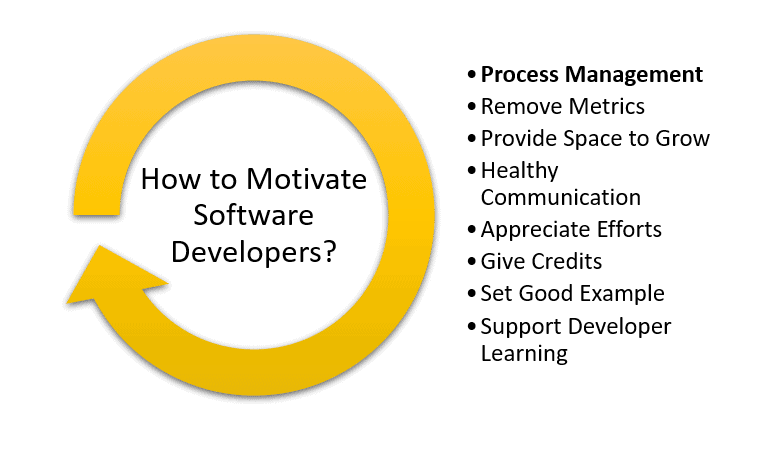Motivated and happy software engineers perform better. But what keeps software engineers happy and motivated? A million-dollar question, indeed.
In this remote/gig economy, retaining valuable talent is an even trickier job.
When Ping-Pong tables, chefs, and other fancy on-site perks cannot do the trick, we need to think about how to keep employees motivated and how to enhance their work quality.
In this article, I’ll show you the drivers that contribute to keeping your software developer team motivated.
Process Management Rather Than People Management
A software developer has to do a lot more than merely code, like go to meetings, document progress, and send emails. Some developers look at these things as distractions from the software problems at hand.
These activities, of course, are necessary to solve specific issues that arise throughout the day. However, management should devise procedures and shape the work environment so that developers can spend most of their time on their projects. Instead of supervising individual tasks and work habits, managers should trust their systems and allow developers to focus on productivity. Too much active management reduces personal responsibility.
The job of developers revolves around solving problems. They carefully analyze a particular scenario, look for all possible solutions, and work to implement the best solution, which requires autonomy.
Managers must train themselves in process management rather than people management. Instructing people what to do and what not to do can oftentimes strip them of their autonomy.
Instead, give developers a challenge and an appropriate amount of time to solve it. For example, suppose a project requires integrating a messaging application, but progress is hindered by an issue in the integration. Most managers in this situation would become output-oriented rather than being helpful. They may instruct their developers to adopt another technology to solve the issue.
But there are numerous other ways in which the problem can be solved. The manager should give the developer appropriate time to solve the issue on their own rather than providing instructions. This will spur a sense of freedom and responsibility in the developer.
It engages them further in higher levels of thinking, which is good for overall progress and keeping them motivated.
“Freedom and responsibility are at the heart of Netflix’s business strategy.”
Get Rid of Irrational Metrics
Many managers measure software developers’ performances through different metrics, like hours logged, number of bugs fixed, or lines of code written.
It might seem funny, but organizations that develop time-tracking applications also implement time tracking for their software developers.
The use of time tracking software for work is not always liked by software developers. They consider it as a premise of measuring performance based on time. However, time tracking mechanisms should be used as tools to allow developers to measure progress and improve themselves and not as a way to evaluate performance.
By setting arbitrary goals based on the measurements stated above, you are eventually creating a flawed way to measure creative professionals’ work. Developers require time to generate new ideas, test their work for efficiency, fail sometimes, and then start all over again.
A developer could generate a piece of code in one hour, but that one-hour code is an outcome of persistent efforts that would range from hours to days.
Rather than quantifying performance, the process should be made qualitative, precise, and segmented. For instance, at project level, the managers should make the developers aware of the organizational processes and standards, encouraging them to work in a modular manner. Hence, the developers will get a proper space to discuss their problems as well as their performance on a particular module with the managers. Together, the managers and developers can find ways for the developers’ continuous improvement as professionals.
To keep software developers motivated, companies should also provide a positive feedback mechanism to engage them and help them improve based on their natural drive for performance—for instance, in cases where the developer does not perform well. The manager should, instead of pointing out mistakes, show the way for improving the performance. Rather than criticizing the developers on petty things, managers should help them in solving problems and achieving their goals.
“GitLab only cares about output and results. It doesn’t care how much time you spend working or if you check Facebook and Twitter throughout the day.”
Provide Space To Grow

A great motivating factor for an individual is esteem and self-actualization. It’s the natural desire for any professional to acquire more knowledge for their growth beyond just meeting their basic survival needs. With time, software developers need to enhance their skills and abilities.
To bring this into practice, companies should provide the proper environment for software developers to grow. For instance, companies like Google have designed their workplace in such a manner that it feels like more than just work. Rather than going out for lunch, fun, and relaxation, employees can find everything they need within the premises.
Google also encourages autonomy, allowing its employees to work in any environment they please. They can work in lounge areas, cafeteria, sitting on beanbag chairs, or wherever they want.
Employees at Google genuinely enjoy going to work, which helps them to grow both physically and mentally.
Proper and Healthy Communication
The language of communication has a significant impact on developers’ work. The dev team should be comfortable with their medium of communication.
Companies should take care not to implement any medium of communication in which the developers are not at ease. Furthermore, they should ensure that managers not use words that sound dominating, harsh, rude, or controlling, making the developers feel stressed and disheartened. Language like this is detrimental to the team’s motivation.
Companies should focus on creating an environment where the leaders seek developers’ opinions or advice rather than being dominant or controlling. They should encourage their teammates to communicate more effectively and make them feel comfortable.
For instance, conduct routine scrum meetings with the team to discuss the progress of the project. Allow the team members to speak their mind regarding any issue or any new idea that can be implemented in the project. It will encourage them to think critically about any problem and come up with new ideas. Accept their opinions on the project.
This will help to keep developers motivated and happy by making them feel heard and valued as part of the team and invested in its success.
“Good communication is a key focus at Zaarly.”
Appreciate and Give Credit
When developers are motivated, they come up with new and innovative ideas. Even if the project is on the right track, you still need creative ideas to implement new features and techniques.
If you’re accepting everyone’s feedback, you will soon find that you are working with the best tech talent. Welcoming new and innovative ideas will help you run your project seamlessly. But, most importantly, these small gestures will make your team of software developers feel appreciated and keep them motivated.
Praising someone can have a massive impact on their motivation. Show recognition to the developers whenever required. Use proper words to show your employees that you genuinely appreciate their efforts and value their talent. Show them how they have helped in driving the project further toward completion. This will give them a significant boost in their confidence, and raise their morale, and, consequently, keep them motivated and productive.
Give Direction and Set a Good Example
Sometimes, a team’s project leaders don’t give the developers a clear direction while working on a project. If the software developers are not given an end goal, they won’t be working at their best, resulting in low productivity.
Management should communicate with team members about the project and where it is heading and update them in a timely manner whenever there is any change—keeping everyone on the same page. Working with an enthusiastic and motivated leader will bring out the team’s best.
Sometimes, if a team finds out that their leaders are not pulling their weight, they might even turn against them. So set a good example for your team to keep them motivated.
Support Learning & Development
Even if you have assembled the right team of developers in your organization, you must ensure that you provide the right conditions for them to thrive.
You, as a leader, should try that your team of developers is not stressed out due to work or any other things. While doing so, you would need a lot of patience.
For instance, let’s say the project you are working on requires the developer to include the live chat feature.
Though the task is simple, the developer is not able to integrate it due to some other issues in the project, and the developer is not able to figure out the issue. In such a situation, the manager has to keep a lot of patience.
The manager should either provide help to the developer by reviewing the code and finding out the problem or should seek help from other sources—developers, online forums, etc. This will give the developer a sense of trust and would motivate them to work with full zeal. Keep your spirits high and make sure the developers in your team are comfortable in their work environment. This will enhance overall productivity.

An organization should encourage developers to learn new technologies. They should provide proper space and time to the developers to upgrade their skills. They should also encourage the developers to undergo various certification programs, take up coding challenges, participate in various skill development events, etc.
This will help the developers build trust with the organization and interest in their work and keep them motivated to perform well.
Don’t Control, Give Control to Your Team
Over the years, it has been observed that creative professionals, including writers, designers, strategists, and developers, thrive when they are given a sense of autonomy, mastery, and purpose.
Any organization functioning in the old model of punishment and reward for controlling software professionals’ performance causes more harm than good. In other words, they are driving away from the best talent by following detrimental techniques and hurting their performance rather than improving it.
I hope these tips will help you boost your team morale. Lastly, motivation is not God-given. It should be replenished regularly to keep people happy and prosperous.

